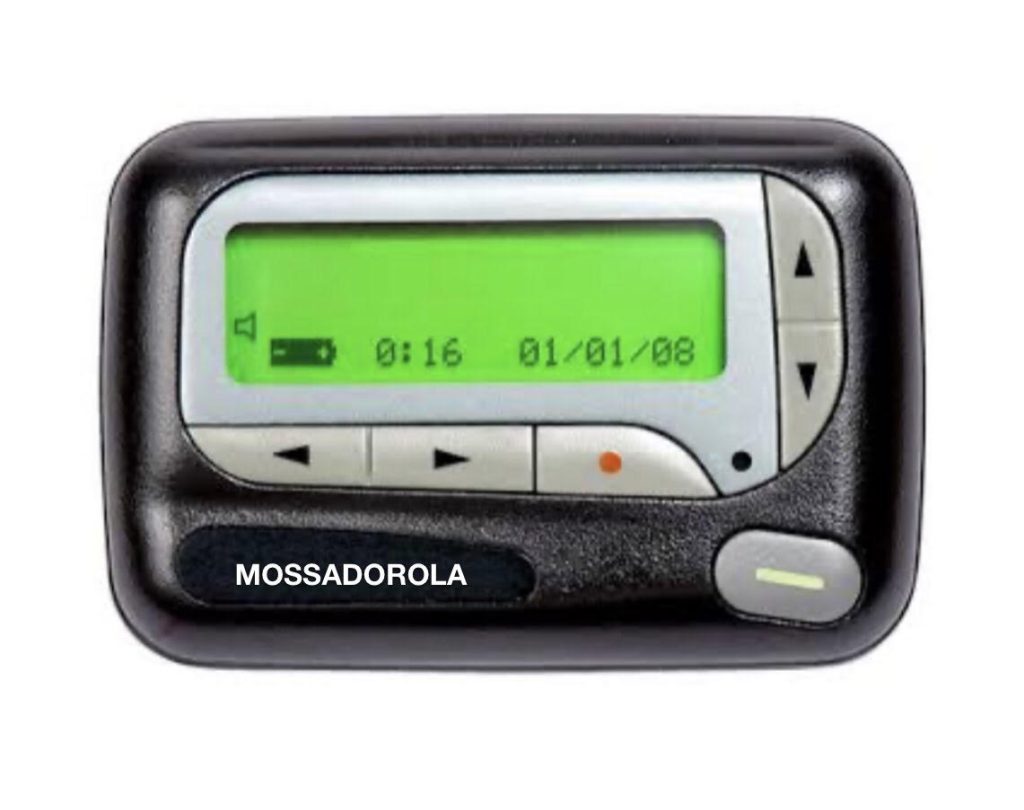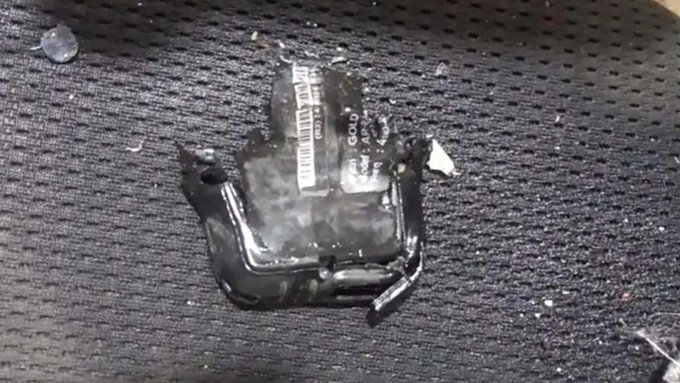Because you can do something does not mean you should do something. But Israel has opened Pandora’s box. It knows it can act with no accountability.
Now that Russia knows this is possible, how long until they use it? I wish they hadn’t done this. Now we’re all potential targets because all supply chains are vulnerable to such attacks as I will explain below.

Hezbollah’s pager network, once a shield against hacking, becomes a weapon of destruction as remotely triggered blasts killed 10, and injured over 3,000.
18 September 2024 — In 2008, at a Pentagon briefing I attended during a trip to the U.S., a presenter noted we must envision a future where wars will be fought not just with soldiers and tanks on battlefields but with invisible weapons: cyber systems embedded in everyday devices, and “info wars” creating societal disruption.
We have seen 1,000s of cyber attacks since that day, and “info wars” across the globe. But what had once seemed “speculative” about devices became a chilling reality in Lebanon yesterday, where a series of explosions involving Hezbollah’s communication devices, triggered by a sophisticated cyber attack.
Oh, yes. Mossad and other intelligence agencies had blown up phones (remotely) for years to kill their enemies. Israeli spies have a decades-long history of using telephones — and their technological successors — to track, surveil and even assassinate their enemies.
But yesterday was different. The explosions, which left at least 10 dead and over 3,000 injured, have exposed a new frontier in modern warfare: cyberspace. Hezbollah’s trusted pager network, thought to be secure and reliable, was suddenly compromised and turned into a series of bombs, targeting those carrying them.
According to a Hezbollah official, the number of casualties continues to rise as the group reels from this unexpected assault. Only days before, Hezbollah had received a new shipment of pagers, devices the group believed were less vulnerable to hacking than modern smartphones. And 1,000s of Hezbollah members had not picked up their new pagers, or had their new pagers off, so were not injured.
The attack marks a pivotal moment in two areas:
– How warfare is conducted in the 21st century. Cyber attacks are often invisible, leaving no trace, no debris, and no smoking gun. They target essential systems — communication networks, power grids, financial institutions — bringing entire nations to their knees without a single conventional weapon being deployed. This attack raises it up a notch.
– The Israeli goal was to undermine Hezbollah’s confidence and create a sense that it is totally penetrated by Israeli intelligence services. It succeeded.
I was in a military intelligence webinar late last night with several participants who had a high-level of knowledge of what occurred. Much of this information was released to the New York Times, the Wall Street Journal, the Financial Times, and other media outlets so you may have seen it already. But to recap:

Israel carried out its operation against Hezbollah on Tuesday by hiding explosive material within a new batch of Taiwanese-made pagers imported into Lebanon. The pagers, which Hezbollah had ordered from Gold Apollo in Taiwan, but were actually produced in Europe, had been tampered with before they reached Lebanon. Most were the company’s AR924 model (a popular model), though three other Gold Apollo models were also included in the shipment. During the webinar last night I saw photos of some of the exploded devices and frankly could not distinguish them until an expert went through each photo and explained serial numbers, configurations, etc.
The explosive material, as little as one to two ounces, was implanted next to the battery in each pager. A switch was also embedded that could be triggered remotely to detonate the explosives. At 3:30 p.m. in Lebanon, the pagers received a message that appeared as though it was coming from Hezbollah’s leadership. Instead, the message activated the explosives. The devices were programmed to beep for several seconds before exploding.
Note to readers: my sources tell me it was around 20g of the highly explosive Pentaerythritol Tetranitrate (PETN) compound that was embedded in the devices. It can be remotely triggered by overheating the battery, or just by a cyber signal. Given the burn marks on several bodies, the theory is it was a cyber signal.
Three independent cybersecurity experts who studied the footage of the attacks (over 120 CCTVs captured explosions, many of them posted on Twitter and Facebook) said it was clear that the strength and speed of the explosions were caused by a type of explosive material. Mikko Hypponen, a research specialist at the software company WithSecure and a cybercrime adviser to Europol and who was on our call and who spoke with several media outlets said:
“These pagers were modified in a way to cause these types of explosions — the size and strength of the explosion indicates it was not just the battery. This was explosives plus a cyber trigger”.
Two Israeli cybersecurity analysts and researchers noted:
– The attacks had targeted Hezbollah where they were most vulnerable
– Hezbollah’s leader, Hassan Nasrallah, strictly limited the use of cellphones, which he saw as increasingly vulnerable to Israeli surveillance, according to some of the officials as well as security experts.
– This attack hit them in their Achilles’ heel because they took out a central means of communication. We have seen these types of devices, pagers, targeted before but not in an attack this sophisticated.
There were conflicting reports on precisely when the pagers were ordered and when they arrived in Lebanon. But the company involved said “within the last 3 weeks”.

The U.S. State Department stuck to its position the U.S. was not involved in the pager explosions in Lebanon, and was not aware of the incident beforehand.
As anyone who knows how these relationships really work behind the headlines, I call bullshit. The U.S knew about it and told Israel not to do it. Israel told the U.S. to shove it … as it always does … and said it was just being courteous and telling them what they’d be doing (and apparently it was rushed because some members of Hezzbollah were on to them). The U.S. begged Israel to give it time to at least try not to impact American interest in Lebanon. Clearly the American University of Beirut Medical Center got a heads up. They were undergoing a communication system update which did NOT include replacing the pagers of their doctors and staff. But 2 weeks ago the Medical Center replaced every pager held by all their doctors and staff.

We live in a world of drones and generative AI and 3-D printing and cryptocurrency and a general metaverse of darkness and evil that few understand or wish to explore. But I do because that’s my “job”. We have an enormous ability to collect information on any potential targets (as the Israelis have demonstrated time after time). The vulnerability of our power grids, our water supplies, our air traffic and aircraft control systems are in the headlines every day. And the vulnerability of our supply chains was surely demonstrated during COVID, but more so yesterday.
Cyber security vulnerabilities in supply chains was always there, stemming from issues like third-party vendor compromises, malicious software updates, embedded hardware flaws, insider threats, and outdated/unpatched systems. A few years back Businessweek had published an alarming story: operatives working for China’s People’s Liberation Army had secretly implanted microchips into motherboards made in China and sold by U.S.-based Supermicro. This allegedly gave Chinese spies clandestine access to servers belonging to over 30 American companies. They had to walk the story back a bit as key parties issued swift and unequivocal denials.
Except then somebody released some classified intelligence documents that showed U.S. spy agencies were warned about the threat in stark terms nearly a decade ago and even showed how China was adept at corrupting the software bundled closest to a computer’s hardware at the factory, threatening some of the U.S. government’s most sensitive machines. And then somebody reminded us that our favorite bête noire National Security Agency whistleblower Edward Snowden had released documents detailing how the U.S. and its allies had themselves systematically targeted and subverted tech supply chains, with the NSA conducting its own such operations, including in China. Oh, my 😱
There really are no longer any barriers to technically impressive attacks.
The global implications of these attacks are profound. Military strategies must now account for cyberspace as a key battleground, where attacks can disrupt societies, economies, and critical infrastructure without firing a shot. From Russia’s suspected cyber attacks on Ukraine’s infrastructure to accusations of Russian hackers targeting U.S. defense contractors, the stakes of cyber warfare are higher than ever.
Pagers, originally developed in the 1940s, were seen as secure and reliable for communication, particularly for professionals like doctors and emergency workers. I could see why Hezbollah liked them. Pagers do not broadcast their location. They are one-way communication devices that receive messages, but they do not send signals back. Pagers operate by receiving signals from a central transmitter, and they do not have the capability to transmit location data.
The message is clear: no system, no matter how outdated or seemingly secure, is immune to cyber manipulation.
The consequences for global security are daunting. As technology becomes increasingly integrated into everyday life, the potential for cyber attacks to cripple essential services grows exponentially. Power grids, transportation networks, and communication systems are all vulnerable targets in future conflicts. Cyber warfare is no longer a future threat but a present reality. By attacking a critical piece of infrastructure, you can paralyse large parts of an economy. Distributed denial-of-service (DDoS) attacks, for instance, where hackers flood systems with junk data, can easily incapacitate essential networks. Hezbollah’s case shows that the digital battlefield is here, and the weapons are often unseen.
The shift in warfare, from land and sea to cyberspace, has profound implications for military forces around the world. Analysts say, Hezbollah once seen as disciplined and invulnerable, has been laid bare, demonstrating that even the most secure organisations are at risk in the digital age. As cyber attacks become more frequent, for military organizations, the lesson is clear: in future warfare, the enemy could be anywhere, the weapons invisible, but the damage will be all too real.

Hezbollah’s new Head of Communications